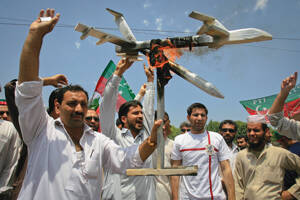In an energetic defense of the Obama administration’s controversial use of drones to target leaders of the Taliban and Al Qaeda networks in Afghanistan, Pakistan, Somalia and Yemen, White House counterterrorism advisor John Brennan called drone strikes not only “ethical,” but “wise.”
Brennan’s presentation at the Woodrow Wilson International Center for Scholars in Washington on April 30 was intended to pull back the curtains on the administration’s drone policy. Brennan called individuals who are part of Al Qaeda or its associated forces “legitimate military targets.” According to Brennan, “We have the authority to target them with lethal force, just as we [targeted] enemy leaders in past conflicts.”
Defending drone strikes, Brennan said that as a matter of international law, the United States was in an armed conflict with “Al Qaeda, the Taliban and associated forces, in response to the 9/11 attacks.” He said, “There is nothing in international law that bans the use of remotely piloted aircraft for this purpose or that prohibits us from using lethal force against our enemies outside of an active battlefield, at least when the country involved consents or is unable or unwilling to take action against the threat.”
“This conduct remains unlawful,” Professor Mary Ellen O’Connell of the University of Notre Dame Law School wrote in an e-mail from London. “The administration has added arguments to their case, but these remain deficient,” she said. “Despite this fact, one year after the killing of Osama bin Laden, the Obama administration has escalated the killing.” O’Connell is the outgoing vice president of the American Society for International Law.
Charles Schmitz, of Towson University in Baltimore, Md., who is a specialist on Yemen, pointed out that a major flaw in the U.S. drone strategy is that the strikes stoke public anger that threatens to undermine support for internal antiterror campaigns in Paki-stan and Yemen. Schmitz argued that drones “have not been effective in stopping the Al Qaeda insurgency” in Yemen.
“Al Qaeda’s success on the ground has been a result of the Yemeni government’s political crises that pit military units against one another and create distrust amongst Yemeni citizens,” he said. More attention to resolving the political crisis in Yemen, he argued, would be a better use of U.S. resources than continuing a drone campaign that merely “bolsters Al Qaeda’s argument that the Yemeni government and other Arab governments are puppets of the U.S.”
Brennan said U.S. drone strikes were ethical because they hit targets that “have definite military value” and attempt to limit “collateral damage.” He said drones can be a “wise choice” because they can reach targets over difficult terrain, strike quickly and “dramatically reduce the danger to U.S. personnel, even eliminating the danger altogether.” He argued that drones also reduce the danger to civilians, “especially considered against massive ordnance that can cause injury and death far beyond their intended target.”
Both O’Connell and Schmitz said, however, that the use of drones far from areas of armed conflict and when specific threats to the U.S. homeland remain difficult to perceive was indeed a violation of international law. They said the strikes themselves were much harder on noncombatants than Brennan suggested.
“The U.S. arsenal is dominated by the Reaper drone that can carry 500-pound bombs,” said O’Connell. “That is what the U.S. is dropping on communities in Yemen, Somalia and Pakistan, where the U.S. is not engaged in armed conflict. Since 2002, nearly 3,000 people have been killed in these three countries through drone attacks. Neither international law nor morality supports such killing.”








